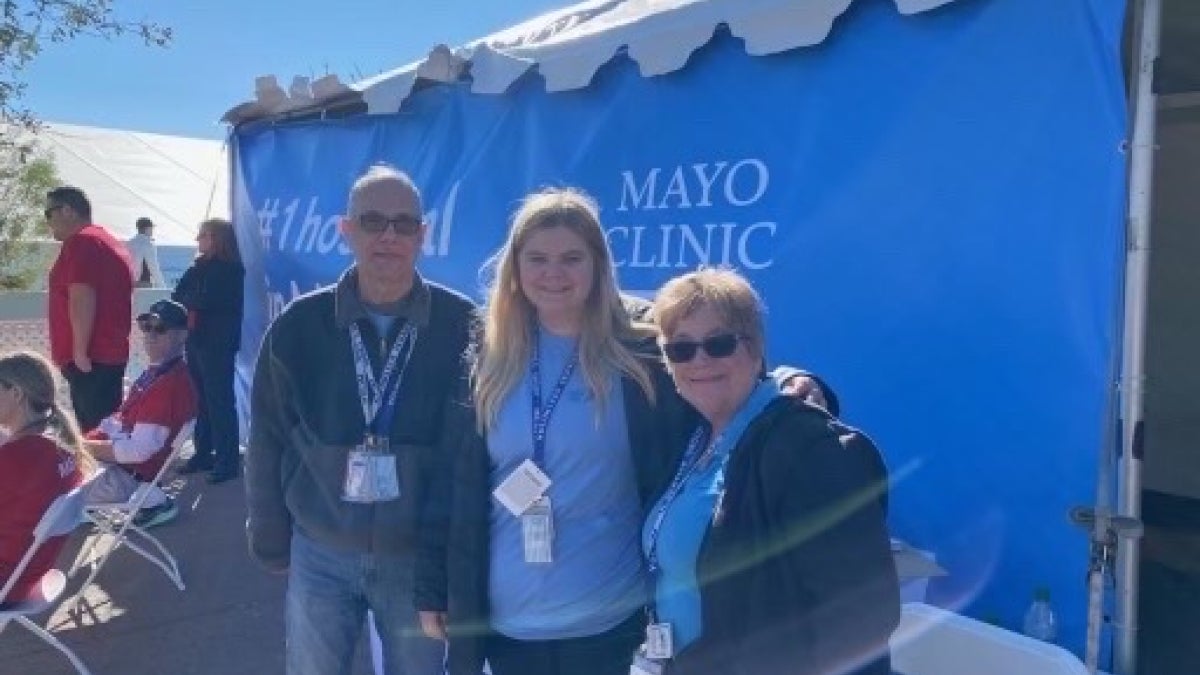ASU students get once-in-a-lifetime public health fieldwork opportunity at 2023 WM Phoenix Open

Junior global health major Hannah Lux with members of the Maricopa County Department of Public Health at the WM Phoenix Open. Photo courtesy Hannah Lux
Student workers at Arizona State University interested in public health got some invaluable hands-on experience in the field when they assisted case investigators and volunteers with contact tracing and field epidemiology at the 2023 WM Phoenix Open.
The Student Outbreak Response Team (SORT), a public health investigation team housed in the School of Human Evolution and Social Change in The College of Liberal Arts and Sciences, provides valuable resources to the public while studying the field of public health.
“The team is a student learning program for students interested in public health, but also, at the same time, it is beneficial to the public health partners,” said Megan Jehn, director of the team and associate professor in the School of Human Evolution and Social Change. “We have provided surge capacity for routine health surveillance and outbreak responses, plus assistance in large pandemics like COVID.”
The team helps address public health challenges such as vaccine hesitancy, food insecurity and infectious disease outbreak dynamics. But like so many others, in March 2020, the team began to focus on the novel coronavirus for ASU and the surrounding communities in collaboration with the Maricopa County Department of Public Health.
Since July 2020, the team has trained over 400 COVID-19 case investigators and completed over 70,000 case investigations.
“Typically, the class is a small group of around 15, but because of COVID, we ballooned up to 400 at one point,” Jehn said. “When doing case investigation and contact tracing for COVID, we had community volunteers and students, upwards of 400 people working.”
At the WM Phoenix Open, the team assisted the public health department with tracking and tracing possible health issues, including COVID-19.
Along with the team's impact on the university and surrounding communities, students are also getting fieldwork experience.
Bailey Holmes, a sophomore majoring in chemistry and pursuing a minor in psychology, was a part of the student response team at the WM Phoenix Open.
“It was an amazing experience. A little terrifying at first because you are around a bunch of medically trained people, and you have to take in a lot of information,” Holmes said. “But also being around all these knowledgeable medical professionals and being involved in the field surveillance process was amazing.”
The WM Phoenix Open is one of the most attended golf events of the calendar season, attracting around 700,000 people throughout the weeklong event.
Holmes and SORT spent the week conducting field assessment surveys, which showed if a health case was isolated or linked to a broader health-related event.
Holmes said the impact this experience and other opportunities for fieldwork have on a college student is unmatched.
“I think there is no better way to learn or comprehend anything other than going out and actually doing it,” Holmes said. “I would hate to sit in a classroom with a paper and imagine what it would be like to be in that scenario when I can go out and be in that scenario. I get to see how to handle a situation. What do you do in stressful moments?”
Hannah Lux, a junior studying global health, also had the opportunity to engage in fieldwork at the tournament.
“I went on a slow day, so I learned a lot through the risk assessment survey and seeing what they ask. It was interesting to look at both nursing and public health fields,” Lux said. “It is a great way to get involved with the community and learn from many different professionals in the field.”
Jehn said fieldwork is a fun moment for all students involved. It helps them decide what direction to steer toward in their educational journey.
“Students need to explore their interests, and it either opens up more doors to learning or it helps rule things out, both of which are very important,” Jehn said. “Students with these field experiences have a more enjoyable collegiate experience and (get to) connect with the community they serve.”
More Health and medicine
Is ‘U-shaped happiness’ universal?
A theory that’s been around for more than a decade describes a person’s subjective well-being — or “happiness” — as having a U-…
College of Health Solutions medical nutrition student aims to give back to her Navajo community
As Miss Navajo Nation, Amy N. Begaye worked to improve lives in her community by raising awareness about STEM education and…

Linguistics work could improve doctor-patient communications in Philippines, beyond
When Peter Torres traveled to Mapúa University in the Philippines over the summer, he was shocked to see a billboard promoting…